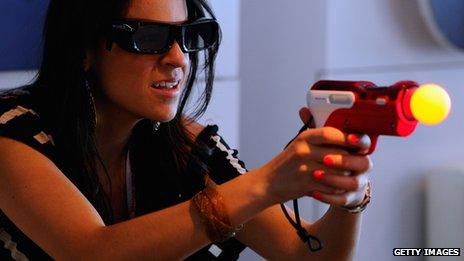Sexual harassment in the world of video gaming
- Published

The world of video gaming has a problem with sexual harassment. The number of women gamers is growing fast - in the US they now make up 42% of the total - but it remains a macho environment, where women are often exposed to abusive language.
(The language in this report reflects that reality.)
"Get back in the kitchen and take your goddamn hands off a video game controller."
The male voices are aggressive, even angry. Their put-downs are laced with strong swearing and sexual insults.
"Stupid bitch," says one. "Fat whore," adds another.
"I hope your boyfriend beats you. Nah, you can't get a boyfriend."
The tirade of abuse ends and Jenny Haniver laughs.
"Get back in the kitchen?" she says. "I'm not in the kitchen because I'm here kicking your ass on video games, that's what I'm good at."

Online gamer Jenny Haniver
We're sitting in her living room in Wisconsin, listening to audio recordings she makes when she goes online to play Call of Duty: Modern Warfare 3. It's a combat-based video game, where players can talk to each other via headsets.
The recordings end up on Haniver's website, Not in the Kitchen Any More. She plays in the evening after college and says most nights she'll have to deal with harassment of some kind. Some of it just puerile, but some is graphic and threatening.
"This enemy player backed out of the middle of the match and sent me a voice message," Haniver says, remembering her worst experience. He said he hoped she would be raped and she and her family killed.
Amazingly, this is not uncommon.
Another website, Fat, Ugly or Slutty, posts examples of harassment from all games - mostly pictures of in-game messages that women receive from other gamers.
"[There's] a plethora of stupidity when it comes to what women receive in online games," says Grace, one of the site's co-founders.
"There are some people who can't even look at Fat, Ugly or Slutty because it reminds them too much of their lives, it upsets them too much," she says. "A lot of people have just walked away from online play entirely."
Several high profile incidents this year have intensified the focus on how women are treated.
In February, video game writer Jennifer Hepler was quoted in a post on the online forum Reddit, suggesting that games would be better if gamers had the option to skip the combat sections. This attracted vicious attacks in online forums and on Twitter, many of them focused on her gender.
Around the same time, a gaming competition called Cross Assault gained widespread notoriety after a male player called Aris Bakhtanians made offensive comments about fellow player Miranda Pakozdi, including guessing her bra size, talking about her body parts, and sniffing her.
All this happened face-to-face at the competition, but was broadcast on an internet video stream. The stream included a discussion in which Bakhtanians claimed that "sexual harassment is part of the culture" of their gaming community, known as the fighting game community.
Bakhtanians also defended the casual use of the word "rape" and phrases like "rape that bitch" as expressions for defeating another character.
"There's nothing unacceptable about that," he claimed. "We're in America, man. This isn't North Korea, we can say what we want."
Pakozdi eventually quit the competition, and a video of excerpts from the internet stream went viral, quickly gaining 200,000 hits on YouTube. Bakhtanians released a statement saying he'd made a mistake and apologising to Pakozdi.
The Cross Assault incident sparked an intense debate.
"Just watching it happen made me a little angry, it was hard for me to watch," says Emily Chow, a member of the fighting game community in Toronto, Canada.
After Cross Assault she blogged about her own experiences of harassment.
"I feel like I should start taking a stronger stand against people who do act this way," she says.
Vince Hui, another Toronto player, says harassment is "a little bit of an epidemic" within the video game community. "In a lot of ways we need to learn to grow up a little bit," he says.
But not everyone felt that Cross Assault was cause for change. Jonathan Quamina, an avid gamer, expressed his support for Bakhtanians, telling him not to apologise.
"As a female you can't get upset if something is said that is obscene if you're hanging out in a room full of guys," he says.
"It's like going to a strip club as a female and getting upset that the chicks are all naked. For me it goes back to freedom of speech. We're a harmless bunch of people. This is just guys being stupid guys."
There's also been pressure this year for gaming companies to do more to combat harassment.
Recently, an online video series called Extra Credits launched a campaign targeting Microsoft's Xbox Live online gaming platform, describing it as "the service most often referenced when harassment in our community comes up".
On the Fat, Ugly or Slutty website, the majority of submissions also come from Xbox Live. Grace from the site says that although gamers can report harassment, there's a widespread perception this achieves nothing.
"I feel a little sad," she says. "For some of the ones that I feel are really blatantly harassing it seems to me that maybe there should be something harsher for it, but maybe not everybody agrees and maybe not even Microsoft agrees."
Looking through the Xbox-related posts on Fat, Ugly or Slutty, it's not hard to find examples that confirm Grace's concerns.
"You are a dumb slut, you stupid whore, I would rape you..." was one example reported to Microsoft - and was sent from an account that is still active.
I found several other similar messages, confirmed that they had been reported, and sent them to Microsoft, requesting an interview to ask why these accounts were still active and what action had been taken. Microsoft turned the request down.

Grace, of Fat Ugly or Slutty, says many women gamers feel reporting abuse achieves nothing
But Extra Credits appears to have had some success. In mid-May, the campaigners were invited to a meeting with Microsoft.
In a statement provided after the meeting, Microsoft said that "bullying and harassment are not welcome on Xbox LIVE" but admitted that "more can be done to create a safe and supportive play environment".
Microsoft says it is working on "near and long-term improvements to Xbox Live" and "our commitment to solving this problem is strong".
James Portnow, from Extra Credits, says: "It looks like they're really making some attempts to move forward with better enforcement. Of course in this industry I don't believe anything until it's out in front of the consumer."
For gamers like Jenny Haniver, any improvements will be welcome.
"I have met so many cool people through Xbox Live, the vast majority of the community is kind and welcoming. It's the absolute minority of people who are jerks, they're just a really loud minority."
<italic>Assignment: Guns, Girls and Games by James Fletcher was broadcast on the BBC World Service. Listen back </italic> <link> <caption>via iPlayer </caption> <url href="http://www.bbc.co.uk/programmes/p00s9jly" platform="highweb"/> </link> <italic>or browse the </italic> <link> <caption>documentary podcast archive</caption> <url href="http://www.bbc.co.uk/podcasts/series/docarchive" platform="highweb"/> </link> <italic>. </italic>